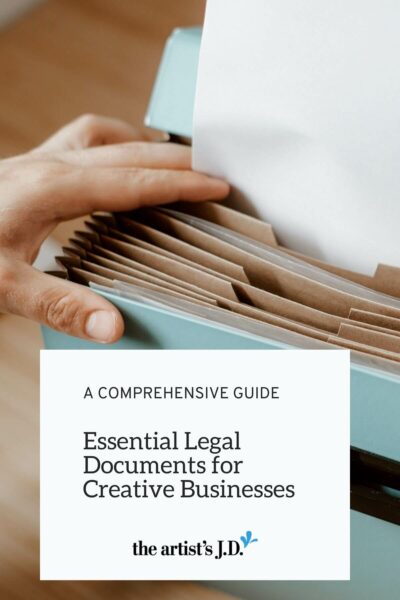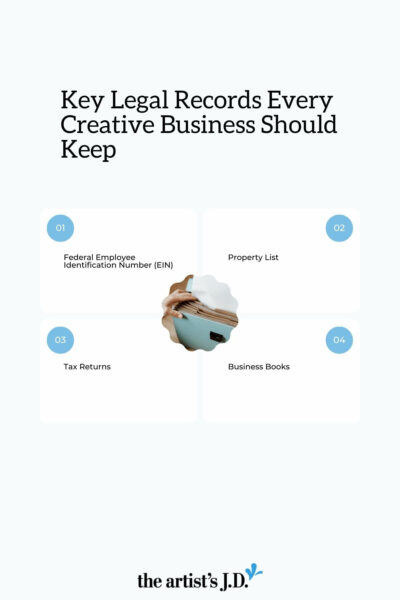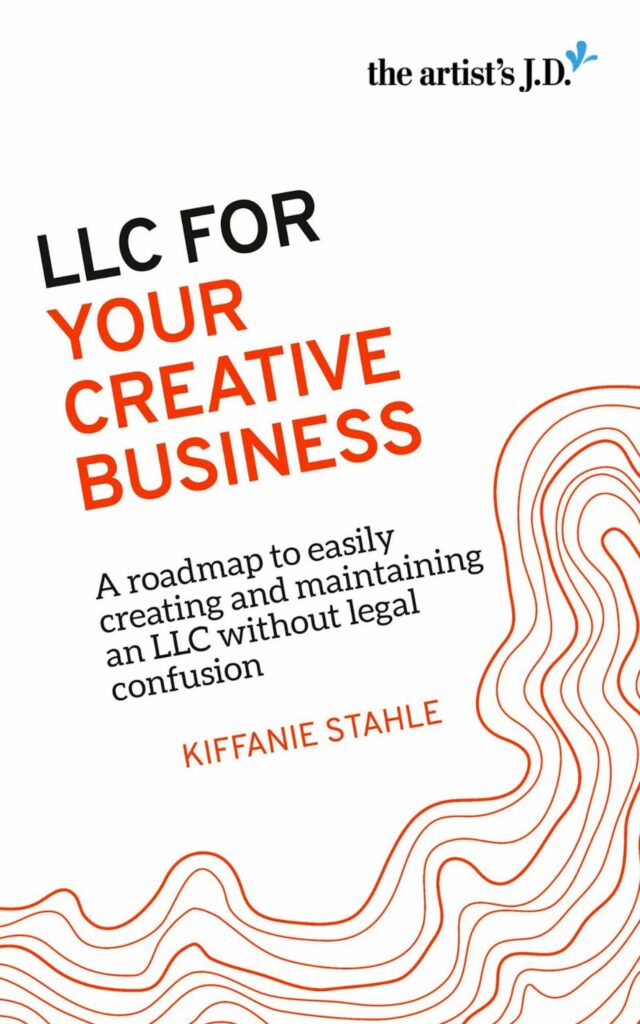As a creative business owner, you might have heard that keeping legal records is a hassle, unnecessary, or even pointless. However, having a centralized file of legal paperwork can save you time and effort when you’re asked for important documents like your sales tax certificate, EIN number, or W-9.
And if you are an LLC or corporation, failing to keep a central file of required documents can weaken the protection that these business types provide.
When you fail to keep these records, you are essentially poking holes in the fence that an LLC/corporation creates between your business and personal lives. And when you poke holes in the fence, it’s easy for an attorney to drive a bulldozer through your fence when you need it most. And what that attorney will be doing is making your personal assets up for grabs, the exact thing you tried to prevent by creating an LLC/corporation.

Short version, every business should have a central legal file where its important legal documents are stored. And what you keep in that folder depends on which legal type your business is.
What should go in that file?
All businesses should have:
- Federal Employee Identification Number
- Property List
- Tax Returns
- Business Books
If you are a corporation, you should also have:
- Articles of Incorporation
- Bylaws
- Board of Directors Minutes + Consents
- Shareholder Minutes
- Shareholder’s List
If you are an LLC, you should also have:
- Articles of Organization
- Operating Agreement
- Members List
- Members Meetings Minutes + Consents
If you are a partnership, you should also have:
- Partnership Agreement
Why Legal Records Matter for Your Small Business
As a creative business owner, you understand the importance of staying organized and doing the things necessary to protect your business.
And one of those necessary things is maintaining the proper legal records and documents.
In this comprehensive guide, we’ll explore the essential legal records you need to keep for your small business to ensure compliance, protect your assets, and streamline your operations.
Why should you take the time to do this dreary and mundane administrative task?
Because keeping accurate and up-to-date legal records will:
- help you spot any holes in your legal compliance
- allow you to quickly and efficiently retrieve records when they are requested
- help safeguard your personal assets
- make tax time easier
- prove you are treating your business like a business
The Key Legal Documents Every Small Business Should Keep

Federal Employee Identification Number
Even if you are a sole proprietor and don’t have employees, I strongly suggest that you get an EIN. That’s because you can use this number instead of your social security number, for all your business documents. Does someone you did work for need a W-9? You can fill out your EIN on it, rather than your social security number. What’s even better is the IRS will let you order one for free here.
Property List
All businesses should keep a list of their business assets, including equipment, inventory, and supplies.
Tax Returns
Businesses should keep in this file the past six years of tax returns for either all the owners personally or the business itself. For new businesses, this means that you’ll compile six and then can destroy the older ones as you file a new return.
Business Books
The full books of your business should be kept for at least four years. (I personally keep them for six so I have the full books in case of an IRS audit.) Once again, new businesses will keep them until you have at least four and then you can delete the data as you accumulate the next year.
Additional Legal Documents for Corporations
If you are a corporation, then you’ll also need these five additional documents in your central file.
Articles of Incorporation
This document can also go by a couple of other names: Certificate of Incorporation or Corporate Charter. Regardless of what it is called, it’s the document that you filed with the State when you incorporated. You should have the original provided by your state (it might be a paper copy or a digital one). And if it’s a paper copy, keep a scanned version of it in your folder.
Bylaws
For a corporation, the bylaws dictate how the corporation must be run. It outlines things like the number of members on the board of directors, how often meetings happen, and how to have those meetings.
Board of Directors Minutes + Consents
The reason many creatives shy away from corporations is because of the record-keeping requirements. Corporations must keep records of approval by the Board of Directors for all major business decisions. These approvals happen at your annual board meetings and via written consents.
Shareholder Minutes
In addition, corporations must hold an annual meeting of their shareholders and keep a record of that meeting.
Shareholder’s List
The corporation must keep a list of all its shareholders. This list should also contain their address, the number of shares, the price paid for their shares, and any dividends.
Additional Legal Records for LLCs
If you are an LLC, then you’ll also need these four additional documents in your central file.
Articles of Organization
Like Articles of Incorporation, this document can go by a few names: Certificate of Organization or Certificate of Formation. But like with a corporation, is the document you filed with your state to become an LLC. You should have the original provided by your state (it might be a paper copy or a digital one). And if it’s a paper copy, keep a scanned version of it in your folder.
Operating Agreement
An Operating Agreement is a document that outlines how the LLC should be run. It also outlines what will happen if certain situations arise. A copy of the original signed version of this agreement should be tucked away in a safe place, with a scanned copy included in your electronic files.
Members List
LLCs should have a list of all the LLC members. This list should also contain their address, their contributions to the LLC, their percentage ownership, and their share of profits and losses.
Members Meetings Minutes + Consents
While the requirements for an LLC are less stringent than a corporation, the LLC should document major business decisions. This can be done via minutes from a meeting or through written consents.
It can be overwhelming to know exactly what’s expected to keep your LLC on the legal up and up

Creating an LLC isn’t:
- as simple as shipping off a form
- a set-it-and-forget-it thing
- a magic bullet to prevent all liability
This book is designed to guide you step by step through the process of making sure your LLC fence remains strong–especially when you need it most.
(If you use the above Amazon affiliate link, we’ll make a small commission, but it doesn’t change the price you pay.)
Additional Legal Records for Partnerships
If you are a partnership, then you’ll also need one additional document in your central file.
Partnership Agreement
A partnership agreement outlines roles, responsibilities, and how profits and losses are shared. This document also should outline how specific situations will be handled. A hard copy of the original signed version of your partnership agreement should be tucked in a safe place, with a backup scanned copy in your files.
Tips and Best Practices for Organizing Your Legal Documents
Want to easily organize your legal documents (like a lawyer)? The below tips and process is what I share with my clients when we work together. And they are what I use myself to keep my legal documents organized.
- Establish a Centralized Folder: Create a dedicated folder (ideally on a cloud storage platform or one that’s regularly backed up) to store all your important legal documents. Name it something like “Important Legal Documents” or “Critical Legal Records” for easy identification.
- Categorize Documents: If you have a lot of documents, then it might be helpful to group them based on categories. For example, group all of your LLC documents together. Or all of your state sales tax certificates together. This makes it easier to locate specific documents when you need them.
- Use a Naming Convention: Use consistent and descriptive file names for each document. For example, when I forward my clients a copy of their signed LLC Operating Agreement, I title it “LLC Name Operating Agreement – signed”.
- Regularly Update and Review: Set aside time once or twice a year to review and update your legal records. Remove outdated or irrelevant documents and ensure all necessary records are included.
TL;DR
Is it a pain to compile these records? It is. But for the most part, you’ll only need to do it once and then they can just sit there until you need them. But keeping these documents show that you are treating your business like a business, and not your personal piggy bank. And for those of you that are LLCs and corporations, keeping your business life separate keeps your fence strong. (Which is the whole reason you went down that road.)
Then if God forbid, something ever goes wrong (like an IRS audit) and you need to provide a bunch of legal records, you’ll have at least one simple task: opening your “Important Legal Documents” folder and providing them the required records.
Take a few minutes this week to organize your small business legal records. Doing so will give you peace of mind. So that you know that when you need them, all you have to do is open one folder and the document you need will be at your fingertips.
Want help getting all your legal ducks in a row?

Wish you had a straightforward strategy to protect your ass(ets) without legal confusion? Then the Legal Roadmap book is your go-to guide.
Inside this book, you’ll find three Maps that will help you build a business you love, built on a strong legal foundation. And you’ll get my guidance step-by-step to execute each of the action items contained in the Maps.
(If you use the above Amazon affiliate link, I’ll make a small commission, but it doesn’t change the price you pay.)

Hi! I’m Kiff! I’m your friendly legal eagle (and licensed attorney).
My goal is to add ease to the legalese. And because I think basic legal resources should be available to every creative, I create a lot of free content.
If I’ve created something that has helped inject a little ease into your creative business and you would like to say “thank you”, you can make a contribution here.
If you’d like to hear more from me, I’d love to pop into your inbox every Friday morning to share additional ways to cut through the red tape and inject a little ease.
Get tips from your friendly legal eagle in your inbox…
Your privacy is important to us. Learn how we protect it here.

